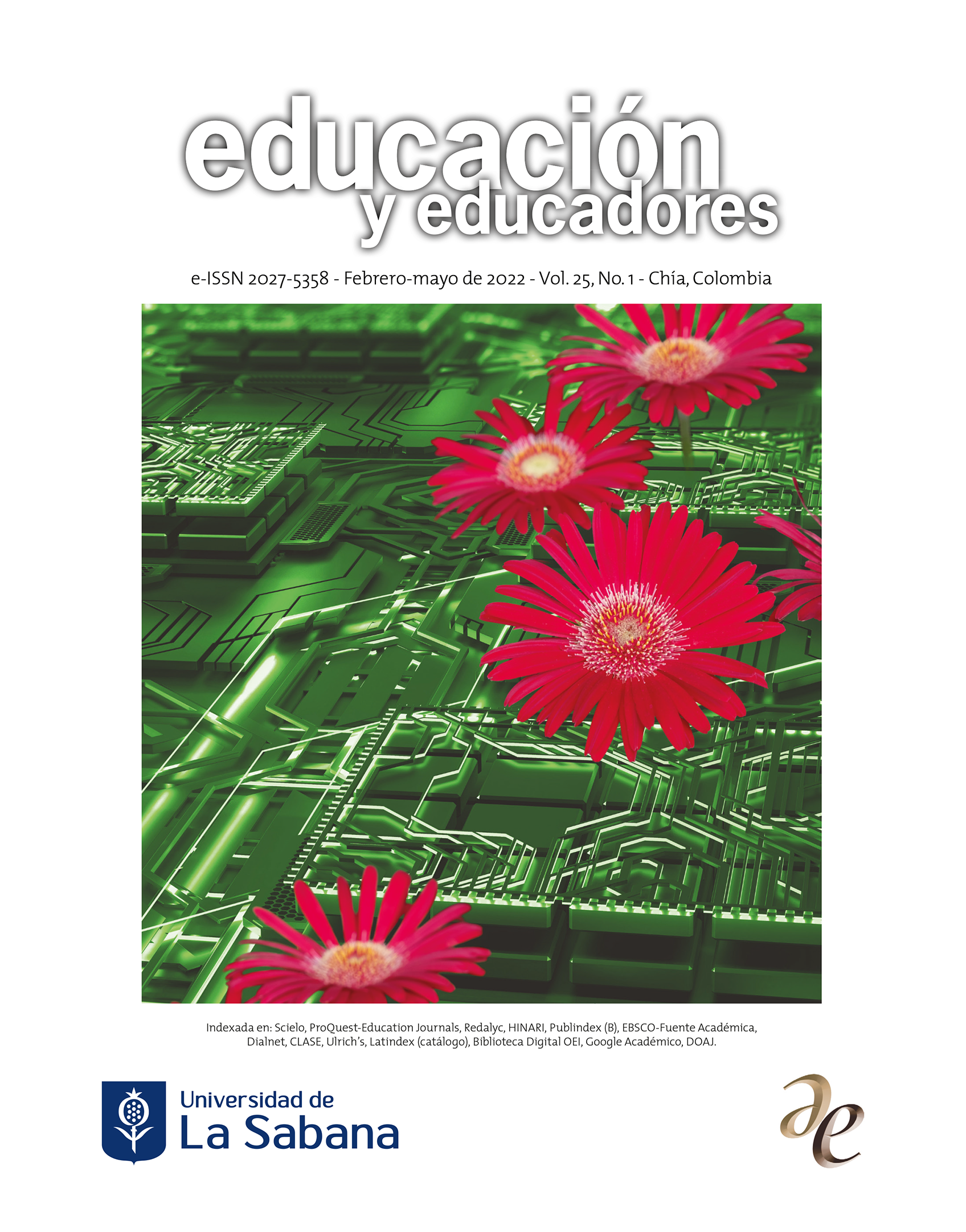Emotional Effects and Coping Strategies in Mexican University Students during COVID-19
DOI:
https://doi.org/10.5294/edu.2022.25.1.2Keywords:
Emotions, behavior, higher education, university student, pandemicAbstract
This study focused on analyzing Mexican university students’ emotional effects and coping strategies during COVID-19 lockdown. Participants were 1,290 students from different Higher Education Institutions who answered an online self-report questionnaire. We carried out descriptive, gender comparative, and regression analyses. Results indicated gratitude, joy, and hope as the primary emotions experienced by university students. However, women experienced more emotions associated with uncertainty, including anxiety. The coping strategies implemented more frequently were those that contributed to reinterpreting the situation. Different factors, such as living with the family, walking/running, and having a personal study space and technological resources, favored positive emotions. On the contrary, going to the doctor was the main vulnerability factor associated with fear, sadness, anxiety, and confusion. From these results, it is necessary to plan educational and social actions to support young people to best cope with this complex reality. It implies adjustments to the educational experience and the relational life in general, considering that adverse situations can also cause students to have positive experiences and continue their online studies.
Downloads
References
Baloran, E. T. (2020). Knowledge, attitudes, anxiety and coping strategies of students during Covid-19 pandemic. Journal of Loss and Trauma, 25(8), 635-642. https://doi.org/10.1080/15325024.2020.1769300
Bisquerra, R. (2009). Psychopedagogy of emotions. Síntesis.
Borgobello, A., Sartori, M. y Sanjurjo, L. (2019). Entornos virtuales de enseñanza y aprendizaje. Experiencias y expectativas de docentes universitarios de Rosario, Argentina. Espacios en Blanco. Revista de Educación, 1(30), 41-58. https://doi.org/10.37177/UNICEN/EB30-263
Brooks, S. K. et al. (2020). The psychological impact of quarantine and how to reduce it: Rapid review of the evidence. The Lancet, 395, 912-20. https://doi.org/10.1016/S0140-6736(20)30460-8
Cao, W. et al. (2020). The psychological impact of the Covid-19 epidemic on college students in China. Psychiatry Research, 287(112934). https://doi.org/10.1016/j.psychres.2020.112934
De la Fuente, J., Peralta-Sánchez, F. J., Martínez-Vicente, J. M., Santos, F. H., Fadda, S. y Gaeta-González, M. L. (2020). Do learning approaches set the stage for emotional well-being in college students? Sustainability, 12(17), 6984. https://doi.org/10.3390/su12176984
Extremera Pacheco, N., Durán, M. A. y Rey, L. (2007). Inteligencia emocional y su relación con los niveles de burnout, engagement y estrés en estudiantes universitarios. Revista de Educación, 44, 239-256.
González-Jaimes, N., Tejeda-Alcántara, A., Espinosa-Méndez, C. y Ontiveros-Hernández, Z. (2020). Psychological impact on Mexican university students due to confinement during the Covid-19 pandemic. SciELO Preprints. https://doi.org/10.1590/SciELOPreprints.756
González, M. y Landero, R. (2007). Cuestionario de afrontamiento del estrés (CAE): validación en una muestra mexicana. Revista de Psicopatología y Psicología Clínica, 12(3), 189-198. https://doi.org/10.5944/rppc.vol.12.num.3.2007.4044
Hendrie, K. N. y Bastacini, M. C. (2020). Autorregulación en estudiantes universitarios: Estrategias de aprendizaje, motivación y emociones. Revista Educación, 44(1). https://doi.org/10.15517/revedu.v44i1.37713
Johnson, M. C., Saletti-Cuesta, L. y Tumas, N. (2020). Emociones, preocupaciones y reflexiones frente a la pandemia del covid-19 en Argentina. Ciencia and Saúde Colectiva, 25 (suplemento 1), 2447-2456. https://doi.org/10.1590/1413-81232020256.1.10472020
Lazarus, R. y Folkman, S. (1984). Stress, appraisal and coping. Springer.
Lazarus, R. y Folkman, S. (1986). Stress and cognitive appraisal. Martínez Roca.
Lozano-Díaz, A., Fernández-Prados, J. S., Figueredo, V. y Martínez, A. M. (2020). Impacts of Covid-19 confinement among college students: Life satisfaction, resilience and social capital online. International Journal of Sociology of Education, Special Issue, 79-104. http://doi.org/10.17583/rise.2020.5925
Moos, R. (1993). Coping response inventory-youth form professional manual. Butterworths.
Ongarato, P., De la Iglesia, G., Stover, J. B. y Fernández, M. (2009). Adaptación de un inventario de estrategias de afrontamiento para adolescentes y adultos. Anuario de Investigaciones, XVI, 383-391.
Orellana, C. y Orellana, L. (2020). Predictores de síntomas emocionales durante la cuarentena domiciliar por pandemia de covid-19 en El Salvador. Actualidades en Psicología, 34(128), 103-120. DOI: https://doi.org/10.15517/ap.v34i128.41431
Pekrun, R., Goetz, T. y Perry, R. P. (2005). Academic Emotions Questionnaire (AEQ). User’s manual. Department of Psychology, University of Munich. https://es.scribd.com/doc/217451779/2005-AEQ-Manual
Piergiovanni, L. y Depaula, P. (2018). Estudio descriptivo de la autoeficacia y las estrategias de afrontamiento al estrés en estudiantes universitarios argentinos. Revista Mexicana de Investigación Educativa, 23(77), 413-432. https://doi.org/10.22235/cp.v12i1.1591
Reyes Pérez, V., Alcázar-Olán, R., Collazo Saldaña, A. y De la Roca Chiapas, J. (2020). Relación entre emociones y estrategias de afrontamiento ante la reprobación en estudiantes universitarios. Psicogente, 23(44), 1-20. https://doi.org/10.17081/psico.23.44.3659
Rocha, T. y Díaz-Loving, R. (2014) Identidades de género. Más allá de cuerpos y mitos. Trillas.
Sandin, B., Valiente, R., García-Escalera, J. y Chorot, P. (2020). Impacto psicológico de la pandemia de covid-19: efectos negativos y positivos en población española asociados al periodo de confinamiento nacional. Revista de Psicopatología y Psicología Clínica, 25(1), 1-22. https://doi.org/10.5944/rppc.27569
Sandín, B. y Chorot, P. (2003). Cuestionario de afrontamiento del estrés (CAE): desarrollo y validación preliminar. Revista de Psicopatología y Psicología Clínica, 8(1), 39-54. https://doi.org/10.5944/rppc.vol.8.num.1.2003.3941
Sawhney, M., Kunen, S. y Gupta, A. (2020). Depressive symptoms and coping strategies among Indian university students. Psychological Reports, 123(2), 266-280. https://doi.org/10.1177/0033294118820511
Vidal-Conti, J., Muntaner-Mas, A. y Sampol, P. (2018). Diferencias de estrés y afrontamiento del mismo según el género y cómo afecta al rendimiento académico en estudiantes universitarios. Contextos Educativos, 22, 181-195. https://doi.org/10.18172/con.3369
Vizoso, C. (2019). Resilience, optimism and coping strategies among students of Educational Sciences. Psychology, Society and Education, 11(3), 367-377. https://doi.org/10.25115/psye.v11i3.2280
Published
How to Cite
Issue
Section
License
Copyright (c) 2022 Educación y Educadores

This work is licensed under a Creative Commons Attribution-NonCommercial-NoDerivatives 4.0 International License.
1. Proposed Policy for Journals That Offer Open Access
Authors who publish with this journal agree to the following terms:
This journal and its papers are published with the Creative Commons License Attribution-NonCommercial-NoDerivatives 4.0 International (CC BY-NC-ND 4.0). You are free to share copy and redistribute the material in any medium or format if you: give appropriate credit, provide a link to the license, and indicate if changes were made; don’t use our material for commercial purposes; don’t remix, transform, or build upon the material.










